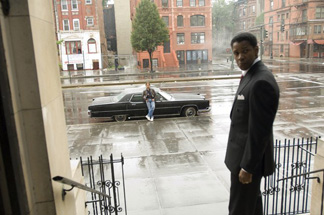Movie Review: American Gangster
By Matthew Huntley
November 19, 2007
BoxOfficeProphets.com

The story, adapted by Steve Zaillian from Mark Jacobson's article, The Return of Superfly, chronicles the rise and fall of Frank Lucas (Denzel Washington), whose determination and control over the heroin drug trade made him one of the richest black men in America. At one point, his assets totaled over $250 million.
Nurtured by Raymond "Bumpy" Johnson (Clarence Williams III), Frank inherits his boss's leadership and gracefully takes control of Harlem. At the height of the Vietnam War, he flies to Bangkok and strikes a deal with a Chinese general (Ric Young) to smuggle heroin into the United States. Frank's plan: sell the drug pure and at a low price.
It's an ingenious scheme because Frank knows it will keep his customers happy and coming back for more. He names his product "Blue Magic" and the sales give him an unprecedented amount of control over junkies and addicts, making his white competition angry and jealous.
Working to bring Frank down is Richie Roberts (Russell Crowe), who takes his career as detective and aspiring prosecutor seriously. Unlike many of his fellow officers, Roberts isn't corrupt and refuses to take bribes. He becomes known as that cop who find once found a million dollars and didn't take any for himself, which gets him ominous looks around the office. Roberts has a conscience when it comes to his work, but as his ex-wife (Carla Gugino) points out, that doesn't necessarily make him a good man. He still sleeps around and avoids domestic responsibilities like being a good father to his son.
When Roberts' partner is found dead because of a heroin overdose, his boss (Ted Levine) gives him an independent assignment to go after the "big players" in the drug trade. His search eventually points him toward Lucas.
American Gangster follows the same structure as other Hollywood crime sagas. There are typical developments like Frank wooing and marrying a beautiful woman (Lymari Nadal); inner-criminal conflicts between Frank and other gangsters (Armande Assante and Cuba Gooding, Jr.); and confrontations with corrupt cops (Josh Brolin). In one scene, Frank "takes care" of the Brolin character in a way not unlike Don Vito Corleone's famous method in The Godfather.
What keeps the movie fresh and moving, other than Scott's relentless energy and the strong performances, is seeing a black man run the show. I'm not sure how accurate a portrayal the film is of the real Frank Lucas, but as Hollywood cinema goes, the character dynamic puts a different spin on the genre and I was glad to see a gangster story with different racial roles.
I also enjoyed seeing the different members of Lucas' family help run the business. The multi-talented Chiwetel Ejiofor plays Huey, Frank's brother, who takes a while to learn the tricks of the trade. And the legendary Ruby Dee plays Lucas' sweet-natured mother, who deliberately doesn't ask her son where all his money is coming from even though she knows in the back of her mind it's through illegitimate means.
As usual, the two leads are forceful and commanding. Washington and Crowe, who engaged in on-screen battle before in Virtuosity, and who twice duked it out for the Best Actor Oscar, are very good duelists on-screen. Washington's performance is trickier than Crowe's because, despite his evil nature, he must still persuade us to like him (and he does succeed). What's interesting is how little screen time the actors actually share, but Scott and Scalia gives them near equal measures. It becomes a two-man story and each side fully develops until the climactic moment when they finally meet.
To be sure, Scott's film is derivative of other greats, including Scarface, Goodfellas, Heat and even the lighter Catch Me If You Can. But there's no denying how well-made it is. The movie recreates its time in the greatest traditon of Hollywood period pieces. Harris Savides' cinematography vibrantly captures a dirty, mean New York City. It's beautiful in the way it's photographed, with grand, swooping tilts and crane shots, but the production design makes it look gritty and putrid.
Scott doesn't make this world look appealing, that's for sure, nor should he have. A lesser director might have tried to romanticize New York City, but the point is to show Lucas' power over a decrepit landscape, where immorality, violence and disgust rule the streets, which also helps explain why Lucas is able to maintain control for so long. When you've got what people want, you've got the people.
There are times when Scott shows he's too in love with his own style, particularly at the end when "Amazing Grace" plays on the soundtrack (the scene will no doubt call to mind the famous baptism scene from The Godfather), and there's little imagination in the way the movie separates its good guys from its bad guys. The Josh Brolin character, for instance, has the usual slicked back haircut, porn-star mustache and extreme forms of violent behavior. I would have like the supporting characters to be more complex and maybe not fit such archetypal molds.
Still, this is a rich and grandiose Hollywood enterprise. Every scene is aggressively watchable and viewers will be amazed how fast its near three-hour runtime goes by. Had American Gangster come out 30 years ago, before movies like The Godfather and Heat paved its way, I'd have considered it a masterpiece and pioneer. In 2007, it's still a great film and a worthy candidate among its fine brethren of crime sagas.